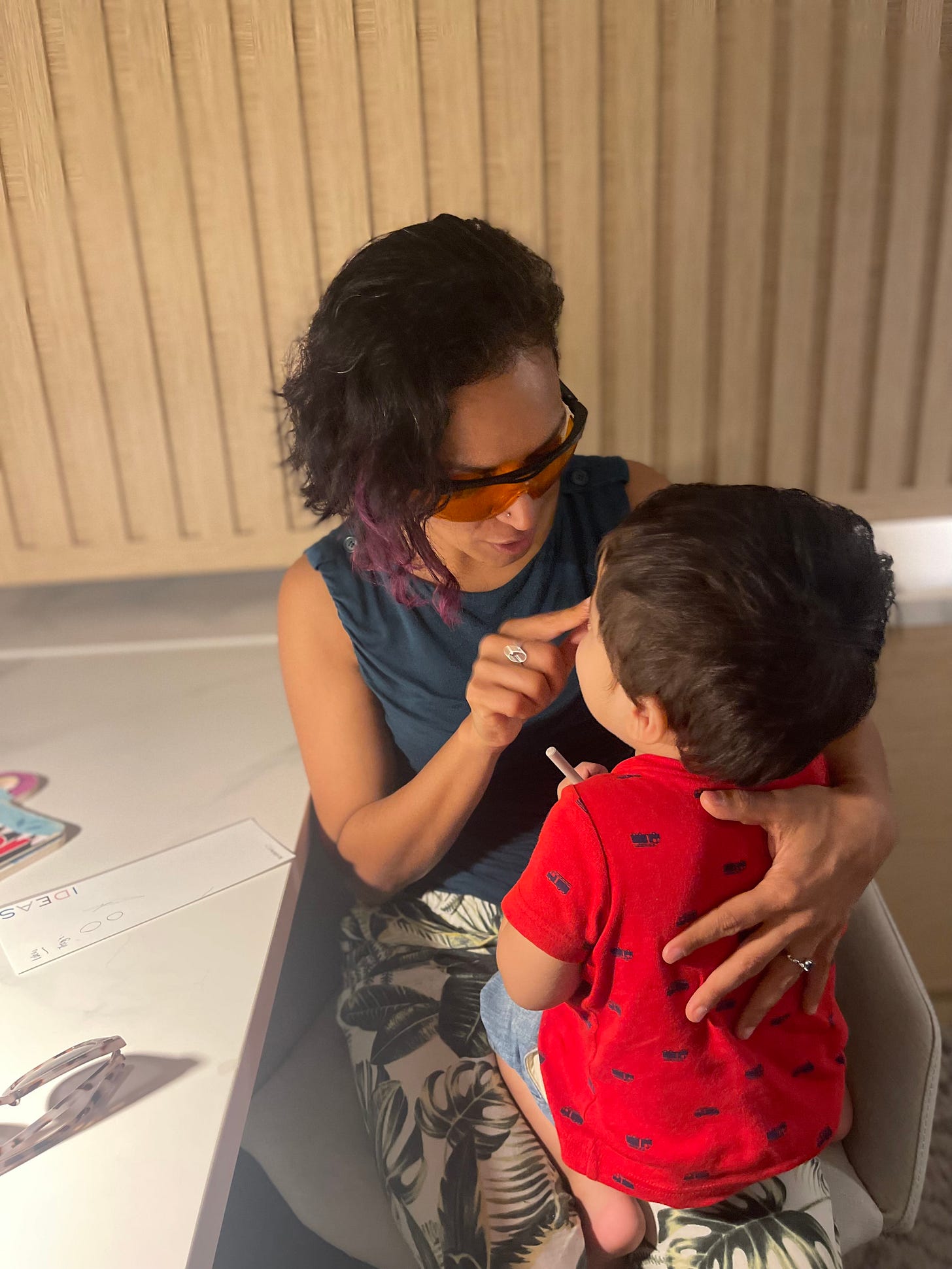Let's sleep better — by capturing darkness
Week 2: Harnessing the power of darkness
Dear community,
We’re in turbulent times and for many of us, sleep and equanimity are further from our reach than usual. I’m sending out love and light, and my hopes for peace.
For those noticing an especially overactive stress response these days — however that shows up for you: tight shoulders, a pit in the stomach, perhaps fear and panic, or anger — try these grounding activities as a starting place. For those with the luxury to do so, try to balance out the increased stressors with intentionally boosting your dose of resilience factors. When possible, root yourself in activities and company that fill your cup and connect you with healing and hope.
These days, we’re practicing ways to sleep better — together.
Sleep has been a nemesis of mine for as long as I have been an adult. Thankfully, my recovery journey with bipolar disorder has led me to discover some powerful tools for higher-quality sleep — and it’s a joy to share them here with you, one by one.
Last week, we highlighted how morning sunlight benefits our mood, cognition, immune function, and sleep-wake cycle, enabling higher-quality sleep. Today, we’ll build on the yin of morning sunlight exposure with the yang of nighttime darkness.
Before we humans invented artificial light, we basically fell asleep with the onset of darkness: the absence of light signaled our pineal gland to produce melatonin, the hormone that helps kickstart sleepiness and all related biological processes.
In our modern world, however, with its many sources of artificial light, our brains receive conflicting cues about whether it’s day or night. After sunset, the blue wavelengths in artificial light and screens, standing in for the sun, can trick our brains into thinking we’re in a sustained, active daytime mode, rather than sleepy nighttime mode. This is because light directly inhibits melatonin production — disrupting our biological drive to sleep. When bathed in artificial light at night, many of us are not producing enough melatonin for optimal sleep and health.
We’ve all faced this: having just watched a movie or scrolled for hours on our phones, we find ourselves lying in bed, wide awake and activated, rather than ready for rest.
To combat this: try wearing blue light-blocking glasses after dusk. (Also really helpful for jet lag — more to come).
Even when we’re using screens, these glasses meaningfully reduce our exposure to the (blue) wavelengths of light that wake our brains up and shut down the production of melatonin. Wear these glasses after sunset, and you’ll drive timely production of enough melatonin to naturally boost your biological drive to sleep and enable higher-quality sleep, especially if you have trouble sleeping. (They have even been shown to reduce symptoms of mania in patients with bipolar disorder.)
And melatonin doesn’t just gate the sleep-wake cycle; it also unlocks other key physiologic functions, including anti-inflammation, anti-oxidant, and glucose regulation processes, so having sufficient levels will have impacts on health well beyond sleep.
A recent study in almost 87,000 adults showed that greater light exposure at night was associated with increased risk for a variety of health conditions, ranging from major depressive disorder, generalized anxiety disorder, post-traumatic stress disorder, self-harm behaviors, bipolar disorder, to psychosis.
Of note, blue light-blocking glasses have been falsely advertised to prevent eye strain — there is no evidence for this — but don't let that stop you from getting these for sleep.
That’s it — that’s my simple and favorite hack for better sleep. What I love about it is that it powerfully taps into and strengthens our natural sleep mechanisms.
Try it: I promise you will feel the difference.
Short of getting the glasses, try these tips for better evening exposure to darkness to boost melatonin production:
Dim or turn off bright lights after dusk.
Stay off or minimize screen exposure for at least 1-2 hours before your desired bedtime.
Keep your sleeping area dark, cool, and quiet. I use this awesome eye mask (which doesn’t put any pressure on your eyes or eyelashes) to prevent light from reaching me and these ear plugs for noise cancellation. Some people like white noise. (PS: No paid sponsorships here — just honest-to-goodness recommendations of what works for me, after a ton of trial and error!)
Is this new to you? Let us know how exploring light and dark exposure to naturally boost your circadian function is affecting your relationship to sleep — and any struggles or learnings you’ve had along the way:
Other articles from the ‘Let’s sleep better’ series:
Let’s sleep better…
Events of note
Stress is Making our Kids Sick: Learn How, Why, and What You Can Do About It: 10/17, 12-1 pm PT. Join us for a free webinar on children, stress, and health: featuring Dr Rachel Gilgoff (pediatric integrative medicine physician; stress expert), Dr Jorina Elbers (stress-responsive pediatric neurologist), and myself (pediatrician; resilience and equity-focused public health practitioner). Register here.
Reddit Ask Me Anything: 10/18, 12:30-1:30 pm PT. I’m partnering with NumberStory to host a Reddit Ask Me Anything session on stress, health, and resilience. Come join us!
In honor of World Mental Health Day and all that’s happening in Israel and Palestine, I wanted to share some well-being lessons from recent posts and podcasts:
International Bipolar Foundation webinar: Lessons from my journey with bipolar disorder (you might recognize a scene with today’s post topic!)
Psychiatry Unboxed with the Kicks Shrink: Beyond labels—life as a physician with bipolar disorder, with psychiatrist Dr Sulman Aziz Mirza
NAMI’s podcast, Hope Starts with Us: Stigma and mental health equity, with NAMI CEO Dan Gillison, activist Angelina Hudson, psychiatrist Dr Napolean Higgins
Beyond the Prescription with Dr Lucy McBride: Finding light and hope within darkness, with internist and fellow Substacker Dr Lucy McBride
Wishing you solid rest,
Dr Devika Bhushan




